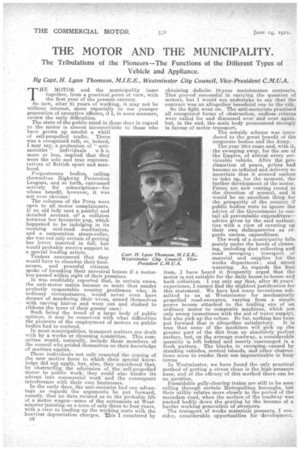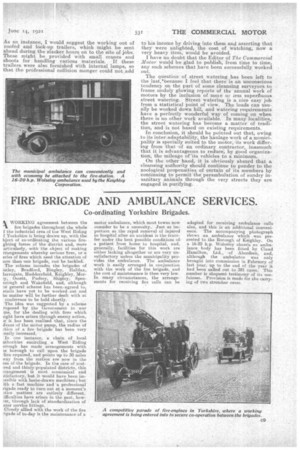THE MOTOR AND THE MUNICIPALITY.
Page 8

Page 9

If you've noticed an error in this article please click here to report it so we can fix it.
The Tribulations of the Pioneers —The Functions of the Different Types of Vehicle and Appliance.
By Capt. H. Lyon Thomson, M.I.E.E., Westminster City Council, Vice-President C.M.U.A.
THE MOTOR and the municipality Came together, from a practical point of view, with the first year of the present century. So now, after 21 years of working, it may not be interest, nterest, more especially to our younger
generation of executive officers, if I, in some measure, review the early difficulties.
The state of the public mind in those days in regard to the motor is almost inconceivable to those who have grown up amidst a whirl of self -propelled traffic. There was a recognized cult, or, indeed, I may say, a profession of " anti motorist individuals w h o, more or less, implied that they were the sole and true representatives of British sport and manhood.
Preposterous bodies, calling themselves Highway Protection Leagues, and so forth, canvassed actively for subscriptions—for whose benefit, however, it was not over obviousl The columns of the Press were open to all motor complainants. If an old lady sent a painful and detailed account of a collision between her favourite pug, which happened to be indulging in its morning mid-road meditation, and a corporation steam-roller, she was not only certain of getting her letter inserted in full, but would probably receive support in a. special leading article. Traders announced that they would have to abandon their businesses, and peaceful citizens spoke of forsaking their ancestral homes if a motorbus passed within sight of their premises. It was creditably reported that, in certain cases., the anti-motor mania became so acute that sundry perfectly respectable country gentlemen who,in ordinary circumstances, would never even have dreamt of murdering their wives, armed themselves with carving knives and went out and slashed to ribbons the tyres of their guests' cars! Such being the trend of a large body of publio opinion, it may be conceived with what difficulties the pioneers of the employment of motors on public bodies had to contend.
In most municipalities, transport matters are dealt with by a works or cleansing comMittee. This committee would, naturally, include those members of the council who prided themselves on their knowledge of matters equine.
These individuals not only resented the coming of -the new motive force to which their special knowledge did not apply, but, also, they considered that, by obstructing the admission of the self-propelled motor to public work, they could also hinder its advent into commercial work and the consequent interference with their own businesses.
In the early days, the anti-motorist had one advantage as regards the arguments he put forward, namely, that no data existed as to the probable life of a motor wagon—some of the extremists at Westminster insisting on a term of only three to four years, with a, view to loading up the working costs with the heaviest depreciation charges. This I countered by obtaining definite 10-year maintenance contracts. This proved successful" in carrying the question of motors, but I would not undertake to say that the contract was an altogether beneficial one to the city. So the fight went on The anti-motorists practised all recognized forms of obstruction, endless returns were called for and discussed over and over again, but, in the end, the main body pronounced strongly in favour of motor transport.
The subsidy scheme was introduced to the great benefit of the corporate bodies and theArmy. The year 1914 came and, with it, the sweeping away, for the use of the Empire, of almost every serviceable vehicle. After the proclamation of peace, prices had become so inflated and delivery so uncertain that it seemed useless to take up, for the moment, the further development of the motor. Prices are now veering round in the direction of normal, and it would be an excellent thing for the prosperity of the country if public bodies were to ignore the advice of the Government to curtail all preventable expenditure— advice given by the said authorities with a view of covering up their own delinquencies as regards useless expenditure. The work of a municipality falls mainly under the heads of cleansing, including dust collecting and road sweeping ; transport of material and supplies for the works department; and street watering. As regards the first item, I have heard it frequently urged that the motor is not suitable for the daily house-to-house and. kerb collection. I can only say that, after 20 years' experience, I cannot find the slightest justification for this statement. We have had many inventions submitted to us at Westminster for mechanically propelled road-sweepers, varying from a simple power broom attached to the trailing eye of an ordinary motor to composite machines, which not only sweep (sometimes with the aid of water supply), but also pick up the refuse. So far, nothing has been
put forward that is altogether satisfactory. It is true that some of the machines will, pick up the greater part of the dirt from an absolutely perfect surface, but., on the average roadway, a considerable quantity is left behind and merely rearranged in a fresh pattern. The blanks in sweepingcaused by standing vehicles, central islands, and other obstructions seem to render their use impracticable in busy towns. In Westminster, we have found the only practical method of getting a street clean is the high-pressure hose, and of the efficacy of this method there can be no question. Formidable gully-clearing trains are still to be seen rolling through certain Metropolitan boroughs, but their utility relates more closely to the period of the macadam road, when the surface of the roadway was pushed bodily down the grating by the brooms of a harder working generation of sweepers. The transport of works materials presents, I consider, considerable opportunities for development. As an instance, I would suggest the working out of roofed and look-up trailers, which might be sent ahead during the slacker hours on to the site of jobs. These might be provided with small cranes and shoots for handling various materials. If these trailers, were also furnished With internal lamps, so that the professional collision monger could not add to his income by driving into them and asserting that they were unlighted, the cost of Watching, now a very heavy item, would be avoided.
I have no doubt that the Editor of The Commercial Motor would be glad to publish, from time to time, any such schemes that have been successfully worked out.
The question of street watering has been left to the last,thecause I feel that. there is an unconscious tendency on the part of some cleansing surveyors to frame unduly glowing reports of thf. annual work of motors by the inclusion of mole Or less superfluous street watering. Street watering is a. nice easy job from a statistical point of view. The loads can usually be worked down hill, and watering requirements have a perfectly wonderful way of coming on when there is no other work available. In many localities, the street watering has become a matter of tradition, and is not based on existing requirements.
In conclusion, it should be pointed out that, owing to its inter-adaptability, the haulage work of a municipality is specially stinted to the motor, its work differing from that of an ordinary contractor, inasmuch that it is advantageous to reduce, by good organization, the mileage of its vehicles to a minimum.
On the other hand, it is obviously absurd that a cleansing authority should continue to pander to the zoological propensities of certain of its members by continuing to permit the perambulation of sundry insanitary animals through the very streets they are engaged in purifying.






































